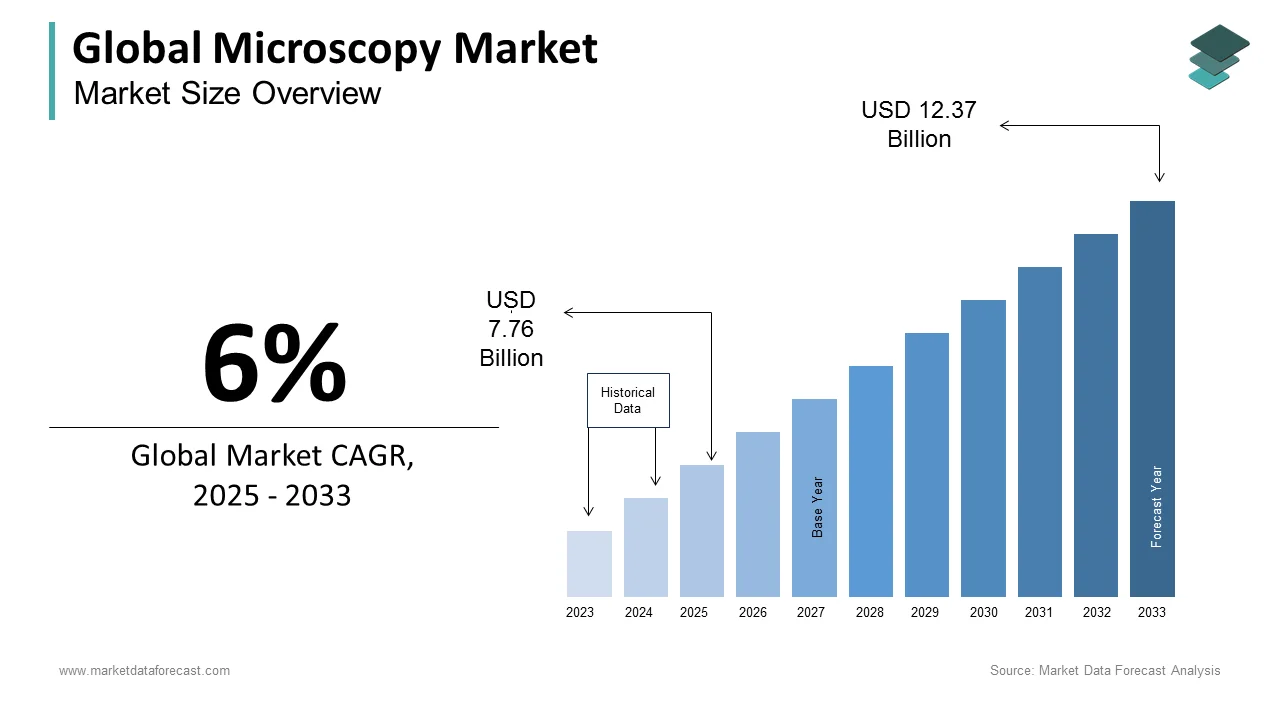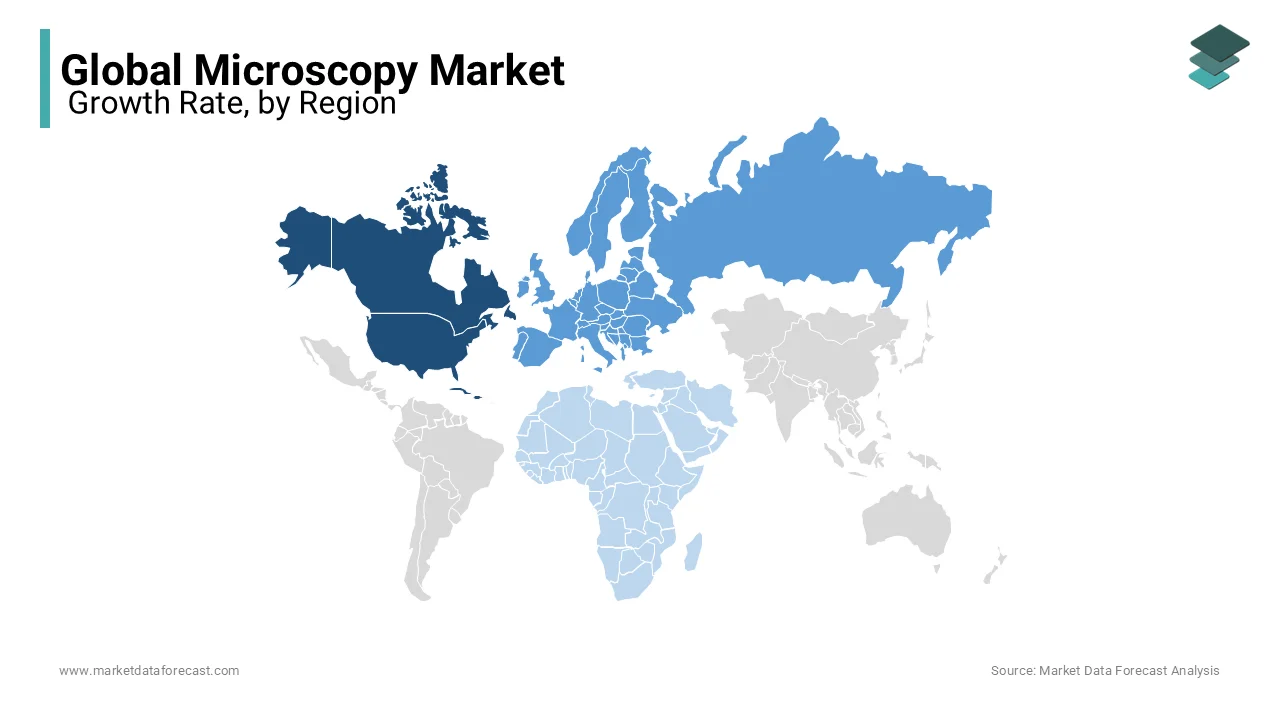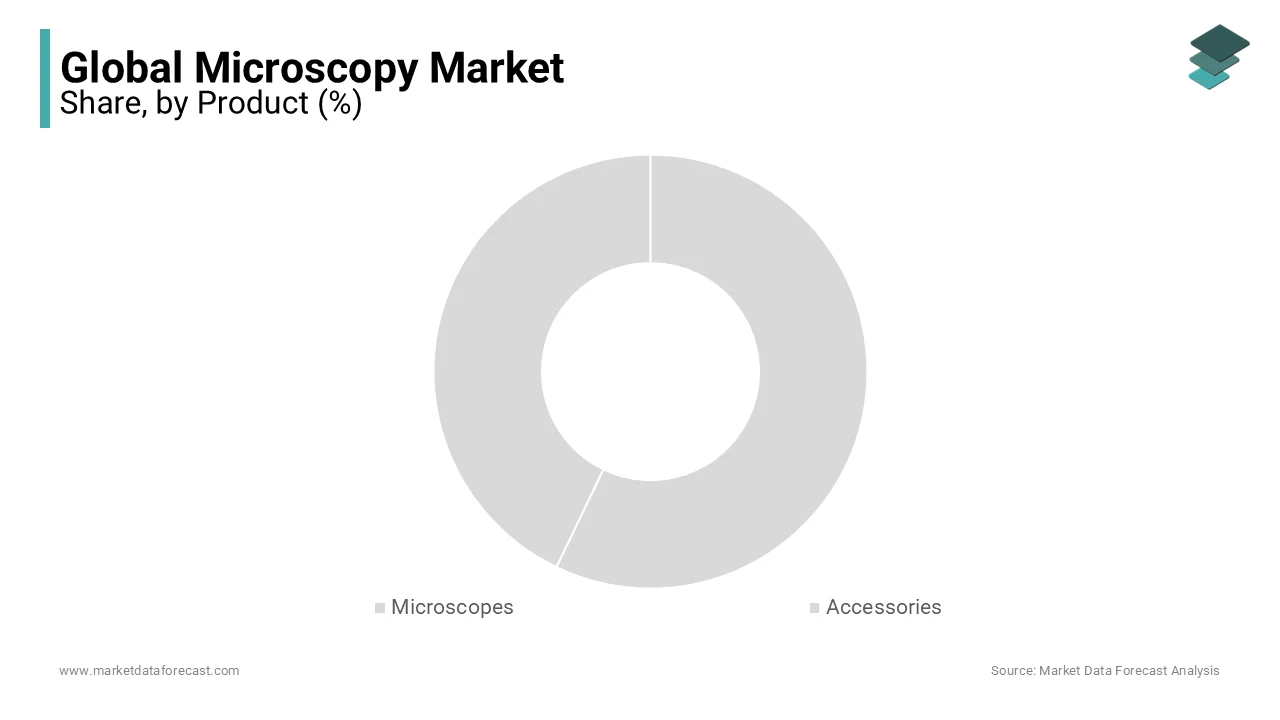Global Microscopy Market Size, Share, Trends & Growth Forecast Report By Product (Microscopes and Accessories), Type (Optical Microscope, Electron Microscope, AFM, STM and NSOM), Application (Semiconductors, Nanotechnology and Electronics), End User (Industrial, Research institution and Blood banks) and Region (North America, Europe, Asia-Pacific, Latin America, Middle East and Africa), Industry Analysis From 2025 to 2033.
Global Microscopy Market Size
The size of the global microscopy market was worth USD 7.32 billion in 2024. The global market is anticipated to grow at a CAGR of 6% from 2025 to 2033 and be worth USD 12.37 billion by 2033 from USD 7.76 billion in 2025.

Materials such as polymers, plastics, alloys, ceramics, and biomaterials are analyzed structurally and chemically using microscopes. Microscopy is better than the rapid diagnostic test (RDT) in detecting malaria in children under five in some trials. It was also recommended that, if available and feasible, microscopy be performed on all patients suspected of having malaria, even if the RDT test was negative since microscopy is still the gold standard for malaria diagnosis.
Presently, the microscopy market is undergoing development and integration or emergence phase of technological advancements. Today, scientists have a range of technology options at their disposal, comprising electron backscatter diffraction (EBBSD), corelative light and electron microscopy, scanning transmission electron microscopy, and 3D electron microscopes. Likewise, artificial intelligence holds the ability to completely transform microscopy image analysis. In the last four years, there has been a noticeable shift in this market among operators towards adopting AI-driven solutions for optimising image acquisition (i.e. also known as smart microscopy), coupled with tasks like virtual staining, super-resolution, restoration, segmentation, image classification, and object classification.
MARKET DRIVERS
Technological developments in microscopy are one of the major factors propelling global market growth.
Recent technological advancements have changed microscopy and improved its capabilities to a great level. With the technological well-developed microscopic solutions, researchers can study biological and material structures at a much higher resolution and with greater accuracy currently. Super-resolution microscopy, Confocal microscopy, Multiphoton microscopy, Light-sheet microscopy, and advancements in software and image analysis tools are some of the recent technological developments in the microscopy market. Researchers are continuously striving further to explore the possibilities of microscopy and the penetration of technology in microscopy solutions is growing with time.
The growing funding for R&D activities in life sciences is driving the microscopy market growth.
Microscopy is used in the life sciences industry for a variety of purposes that includes studying cellular structures to developing new drugs and therapies. The recent COVID-19 pandemic has also contributed to the growth of the microscopy market. During the COVID-19 pandemic, microscopy has been used to study the structure and behavior of the virus. The growing investments and grants from governmental organizations such as the USNIH and the Horizon 2020 program of the European Union are further promoting the growth rate of the microscopy market. The rising adoption of precision medicine is accelerating and an increasing number of advancements in neuroscience research are further boosting the growth rate of the microscopy market.
The growing demand for nanotechnology also supports the growth of the microscopy market.
The penetration of nanotechnology is growing rapidly in various industries such as electronics, energy, healthcare, and others. Microscopy is one of the most used tools in nanotechnology to visualize and characterize nanomaterials. The increasing usage of nanomaterials in medicine and consumer products, the rising usage of scanning electron microscopy (SEM) to visualize nanomaterials, and the growing usage of transmission electron microscopy are some of the factors that are propelling the demand for nanotechnology. The growing demand for nanotechnology is resulting in the growth of the microscopy market.
The rising adoption of microscopy in material science is favoring market growth.
In addition, the growing demand for high-resolution imaging in various applications, increasing emphasis on drug discovery and development, rising demand for advanced microscopy techniques in clinical diagnostics, and increasing application of microscopy in forensic sciences are supporting the microscopy market growth. Furthermore, rising investments in academic research centers and government initiatives in favor of microscopy, growing demand for microscopes in the electronics industry, and rising demand for microscopy in environmental testing and monitoring are adding fuel to the growth rate of the microscopy market. The rising usage of microscopy in the oil and gas industry and food and beverage testing, an increasing number of advancements in software and image analysis tools for microscopy, and the rising adoption of automated microscopy for high-throughput analysis are further fuelling the growth rate of the microscopy market.
MARKET RESTRAINTS
High costs associated with advanced microscopy equipment are hampering the growth of the microscopy market.
Due to the high costs of electron microscopes, confocal microscopes, and super-resolution microscopes, it is difficult for research labs and educational institutions to adopt them. The scarcity of skilled professionals that can handle the operations and relevant analysis of microscopy is further hindering the market growth. In addition, limited funding for the research and development of microscopy technologies, competition from alternative technologies, technical challenges, the stringent regulatory environment for microscopy, and high costs of maintenance and repair are further impeding the market growth. Furthermore, complexities of data analysis, limited access to advanced microscopy equipment, and limited compatibility with other technologies are showcasing a negative impact on the growth of the microscopy market.
MARKET OPPORTUNITIES
Cryo-electron microscopy (cryo-EM) presents potential prospects for the expansion of the microscopy market. It is an advanced imaging technique for examining bio-molecular structures and networks at near-atomic resolution. The main benefit of cryo-EM rests in its capability to analyze these molecules at their near-native condition, free from needing crystallization, which can possibly interrupt their natural shapes or interactions. It stands
out as an excellent choice for investigating dynamic and large biomolecular networks, macromolecular assemblies, and membrane proteins. These subjects have conventionally or historically been difficult to study using other structural biology methods such as NMR spectroscopy or X-ray crystallography. Apart from this, in recent years, we have seen incredible advancements in this microscopy technology, including both software and hardware improvements that have elevated the field to unprecedented levels of efficiency and resolution, holding the potential to drive forward market growth. Besides these, among the most important hardware breakthroughs is the launch of direct electron detectors. These unique cameras can directly register incoming electrons, offering superior signal-to-noise ratios and enhanced contrast when compared to standard charge-coupled device (CCD) cameras.
MARKET CHALLENGES
Obtaining sharp and precise microscopic images is one of the key challenges before the microscopy market. It is tricky because of imaging artifacts. These unwanted distortions or anomalies can compromise the quality of the images and result in analysis errors. It further includes the saturation or blooming artifact, pixelation artifact, time-varying or temporal noise, photobleaching or phototoxicity, and compression artifact.
Another factor impeding market growth is the medical issues reported by operators of microscopes.
· According to a published study, between 50 % to 60 % of employees in this field reported the neck-related problems, 65 % to 70 % said shoulder-associated issues, 70 % to 80 % said back (total), lower back with 65 % to 70 %, eyestrain with 20 % to 50 %, headaches with 60 % to 80 percent.
Therefore, many medical practitioners suffer from these problems which continues to hinder the market growth.
REPORT COVERAGE
|
REPORT METRIC |
DETAILS |
|
Market Size Available |
2024 to 2033 |
|
Base Year |
2024 |
|
Forecast Period |
2025 to 2033 |
|
Segments Covered |
By Product, Type, Application, End-User, and Region |
|
Various Analyses Covered |
Global, Regional & Country Level Analysis, Segment-Level Analysis, Drivers, Restraints, Opportunities, Challenges, PESTLE Analysis, Porter’s Five Forces Analysis, Competitive Landscape, Analyst Overview on Investment Opportunities |
|
Regions Covered |
North America, Europe, Asia Pacific, Latin America, Middle East & Africa |
|
Key Market Players |
Carl Zeiss, Danaher, Thermo Fisher, Nikon, Bruker Corporation, Olympus, Oxford Instruments, JEOL, Hitachi High-Technologies, Keyence, Vision Engineering and Helmut Hund. |
SEGMENTAL ANALYSIS
By Product Insights
The microscopes segment held the major share of the global microscopy market in 2024 and the domination of the segment is predicted to continue during the forecast period. The growth of the segment is primarily driven by the growing demand for high-resolution imaging techniques in various fields such as life sciences, material sciences, and nanotechnology, and advancements in technology such as the development of super-resolution microscopy. In addition, the growing funding by various governments to conduct R&D in developing countries and increasing investments in the semiconductor industry are further fuelling the segment’s growth rate.
The accessories segment is predicted to hold a considerable share of the worldwide market during the forecast period. The growing demand for accessories that enhance the imaging capabilities of microscopes, the rising adoption of digital microscopy solutions, and the increasing demand for accessories used in routine laboratory applications are propelling segmental growth. In addition, the growing demand for accessories used in industrial applications, such as quality control and inspection is accelerating segmental growth.
By Type Insights
The electron microscope segment is estimated to witness the highest CAGR during the forecast period. The benefits of electron microscopes such as higher resolution images compared to optical microscopy and increasing adoption of electron microscopes in advanced research applications are majorly boosting segmental growth. The rising demand for electron microscopes in various applications such as materials science, nanotechnology, and life sciences and the increasing usage of electron microscopes in semiconductor and electronics industries to defect analysis and failure analysis are further propelling segmental growth.
The optical microscope segment held a considerable share of the worldwide market in 2024 and is expected to grow promisingly during the forecast period. The cost-effectiveness of optical microscopes is majorly boosting segmental growth. Due to this convenience, the adoption of optical microscopes is high among small research labs and educational institutions. The growing demand for optical microscopes in the material science industry and the rising usage of optical microscopes in the life sciences industry are boosting the growth rate of the segment.
By Application Insights
The semiconductor segment is anticipated to hold the major share of the global microscopy market during the forecast period owing to the growing demand for semiconductors. The usage of semiconductors has growing gradually over the last several years in various applications such as consumer electronics, automotive, healthcare, and industrial automation. In addition, the growing adoption of nanotechnology in the semiconductor industry and increasing adoption of technological developments such as the Internet of Things (IoT), artificial intelligence (AI), and 5G networks are further boosting segmental growth.
During the forecast period, the nanotechnology segment is predicted to hold a considerable share of the worldwide market owing to the rising adoption of nanotechnology in various applications such as healthcare, electronics, energy, and materials science.
By End-User Insights
The research institution segment held a substantial share of the global microscopy market in 2024, and its domination is predicted to continue during the forecast period. The growth of the segment is majorly driven by the growing demand for high-resolution imaging and analysis tools in various fields of research, including biological, medical, and material sciences. Factors such as the increased funding, grants, and initiatives by governmental organizations for research and development, the rising number of partnerships between public and private organizations, and the growing demand for improving healthcare outcomes are further fuelling the growth rate of the segment. The growing usage of digital microscopy and artificial intelligence-based analysis tools is another major factor boosting segmental growth.
The industrial segment is estimated to witness the fastest CAGR during the forecast period. The growth of the segment is majorly favored by the growing demand for microscopy technologies in manufacturing and quality control processes. In addition, the rising adoption of automation and Industry 4.0 technologies is another notable factor contributing to the segment’s growth rate.
REGIONAL ANALYSIS
North America had the largest share of the worldwide market in 2024.
The domination of the North American region will likely continue during the forecast period. The presence of notable market participants and an increasing number of investments by governmental and non-governmental organizations for the R&D of microscopy are contributing to the microscopy market growth in North America. During the forecast period, the U.S. microscopy market, followed by Canada, is predicted to hold the largest share of the North American market. The growing need for advanced microscopy techniques in the healthcare industry in the U.S. and the presence of numerous pharmaceutical and biotechnology companies in the U.S. are fuelling the microscopy market growth in the United States.

Europe had a substantial share of the worldwide market in 2024 and is anticipated to showcase a noteworthy CAGR during the forecast period. The presence of sophisticated healthcare infrastructure in the European region and increasing demand for advanced microscopy techniques in the pharmaceutical and biotechnology industries are majorly driving the microscopy market in the European region. The rising demand for precision medicine and the growing need for improved healthcare outcomes are propelling the European microscopy market's growth. Germany, France, and the United Kingdom held the major share of the European market during the forecast period.
Asia-Pacific is predicted to witness the fastest CAGR during the forecast period. The rising investments by market participants for research and development and the increasing adoption of microscopy in the healthcare industry majorly drive the growth of the APAC market. In addition, the growing adoption of automation and Industry 4.0 technologies in manufacturing is another notable factor contributing to the growth of the APAC microscopy market.
Latin America is anticipated to grow at a steady CAGR during the forecast period owing to the increasing number of initiatives by the Latin American governments in favor of microscopy and growing investments by the life sciences industry. Brazil, Mexico, and Argentina are predicted to occupy the leading share of the Latin American market during the forecast period owing to the increasing number of R&D activities and the rising number of improvements in the healthcare infrastructure in the Latin American countries.
MEA is forecasted to hold a moderate share of the worldwide market in the coming years.
KEY MARKET PLAYERS
Some of the major manufacturers present in the microscopy market include Carl Zeiss, Danaher, Thermo Fisher, Nikon, Bruker Corporation, Olympus, Oxford Instruments, JEOL, Hitachi High-Technologies, Keyence, Vision Engineering and Helmut Hund.
RECENT HAPPENINGS IN THE MARKET
- In October 2025, it was announced that researchers have devised a novel microscope with an innovative characteristic which has the potential to wirelessly transmit live images from within living mice to a smartphone or laptop using Bluetooth. When this technology is miniaturised, it will allow test subjects like mice to roam freely, providing scientists the opportunity to study their behaviour in a more natural setting. This imaging technique for noticing in real-time the inner functionality of a living organism will be a major boost to this market.
- In October 2025, the Medical Laboratory Sciences Department under the University of Ghana announced the delivery of microscopes by the Turkish Cooperation and Coordination Agency (TIKA). The equipment support was provided to the students who are studying with limited resources, i.e. having only 7 old-generation working microscopes at 3 big laboratories. Besides this, the National Health Students Association of Ghana (NAHSAG), a medical student’s community, appealed for support via the Turkish Embassy in Accra, which was then delivered 9 binocular microscopes and 2 digital microscopes.
- In August 2025, scientists at the University of Arizona reported the creation of the fastest electron microscope ever. It can capture stunning freeze-frame images of electrons in action, significantly benefiting this market. This ground-breaking achievement could change the understanding of quantum physics and influence a variety of scientific fields. Moreover, the experts believe this innovation could open the way for pioneering developments in material science, bioengineering, chemistry, physics, and beyond.
MARKET SEGMENTATION
This market research report on the global microscopy market has been segmented and sub-segmented based on product, type, application, end-user, and region.
By Product
- Microscopes
- Accessories
By Type
- Optical Microscope
- Electron Microscope
- Afm (Atomic Force Microscopy)
- Stm (Scanning Tunneling Microscope)
- Nsom (Near-Field Scanning Optical Microscope)
By Application
- Semiconductor
- Nanotechnology
- Electronics
By End User
- Industrial
- Research Institutions
- Blood Banks
By Region
- North America
- Europe
- Asia Pacific
- Latin America
- The Middle East and Africa
Frequently Asked Questions
What is the growth rate of the global microscopy market?
The global microscopy market size is expected to grow at a CAGR of 6.0% from 2025 to 2033.
Does this report include the impact of COVID-19 on the microscopy market?
Yes, we have studied and included the COVID-19 impact on the global microscopy market in this report.
Which region led the microscopy market in 2024?
Geographically, the APAC region dominated the microscopy market in 2024.
Who are the major players operating in the microscopy market?
Carl Zeiss, Danaher, Thermo Fisher, Nikon, Bruker Corporation, Olympus, Oxford Instruments, JEOL, and Hitachi High-Technologies, Keyence, Vision Engineering, Helmut Hund are some of the noteworthy companies operating in the global microscopy market.
Related Reports
Access the study in MULTIPLE FORMATS
Purchase options starting from $ 2500
Didn’t find what you’re looking for?
TALK TO OUR ANALYST TEAM
Need something within your budget?
NO WORRIES! WE GOT YOU COVERED!
Call us on: +1 888 702 9696 (U.S Toll Free)
Write to us: [email protected]

